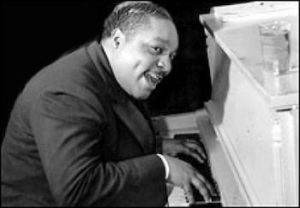
Albert Ammons
*Albert Ammons was born on this date in 1907. He was a Black pianist and player of boogie-woogie, a bluesy jazz style popular from the late 1930s to the mid-1940s.
Albert Clifton Ammons was born in Chicago, Illinois. His parents were pianists, and he learned to play by age ten. His interest in boogie-woogie is attributed to his close friendship with Meade Lux Lewis and his father's interest in the style. Albert and Meade would practice together on the piano in the family’s home. Ammons learned about chords by marking the depressed keys on the family pianolet (player piano) with a pencil and repeated the process until he had mastered it.
As a teenager, he also played percussion in a drum and bugle corps and soon performed with bands in clubs in Chicago. After World War I, he became interested in the blues, learning by listening to the Chicago pianists Hersal Thomas and the brothers Alonzo and James ‘Jimmy’ Yancey.
In the early to mid-1920s, Ammons worked as a cab driver, as did his boyhood friend Meade Lux Lewis. Soon, the two players began working as a team, performing at club parties. Ammons started his band at the Club DeLisa in 1934 and played with a five-piece band for two years. He also recorded as Albert Ammons's Rhythm Kings for Decca Records in 1936. The Rhythm Kings' version of "Swanee River Boogie" sold a million copies, and their 1936 recording of "Boogie Woogie Stomp" has been described as "the first 12-bar piano-based boogie-woogie, imitated by many jazz bands."
Ammons moved to New York City, where he teamed up with another pianist, Pete Johnson. The two performed regularly at the Café Society, occasionally joined by Lewis or other jazz musicians, including Benny Goodman and Harry James. On December 23, 1938, Ammons appeared at Carnegie Hall with Johnson and Lewis in From Spirituals to Swing, a concert produced by John H. Hammond, which helped launch the boogie-woogie trend. Two weeks later, producer Alfred Lion, who had attended the concert, started Blue Note Records, recording nine Ammons solos, including "The Blues" and "Boogie Woogie Stomp," eight by Lewis and two duets in a one-day session in a rented recording studio. In 1941, Ammons's boogie-woogie music supplemented a drawn-on-film animation in the short film Boogie-Doodle. Ammons played himself in the movie Boogie-Woogie Dream (1944) with Lena Horne and Johnson.
As a sideman with Sippie Wallace in the 1940s, Ammons recorded a session with his son, the tenor saxophonist Gene Ammons. Although the boogie-woogie fad began to die in 1945, Ammons had no difficulty securing work. He continued to tour as a solo artist and, between 1946 and 1949, recorded his last sides for Mercury Records with the bassist Israel Crosby. He also took on the position of staff pianist with the Lionel Hampton Orchestra. In 1949, he played at the inauguration of American President Truman. During his last years, Ammons played mainly at the Beehive and Tailspin Club in Chicago.
Ammons has widely influenced countless pianists, such as Jerry Lee Lewis, Dave Alexander, Dr. John, Hadda Brooks, Johnnie Johnson, Ray Bryant, Erroll Garner, Katie Webster, Axel Zwingenberger, and Henri Herbert. Four days before he died, he had been at Jimmy Yancey’s apartment listening to Don Ewell and Yancy play. Ammons could play only one song, having just regained the use of his hands after a temporary paralysis. Albert Ammons died of natural causes on December 2, 1949, in Chicago, around three months before his 43rd birthday. German pianist Jörg Hegemann honored Ammons on his album, A Tribute to Albert Ammons, on the 100th anniversary of Ammons' birth.